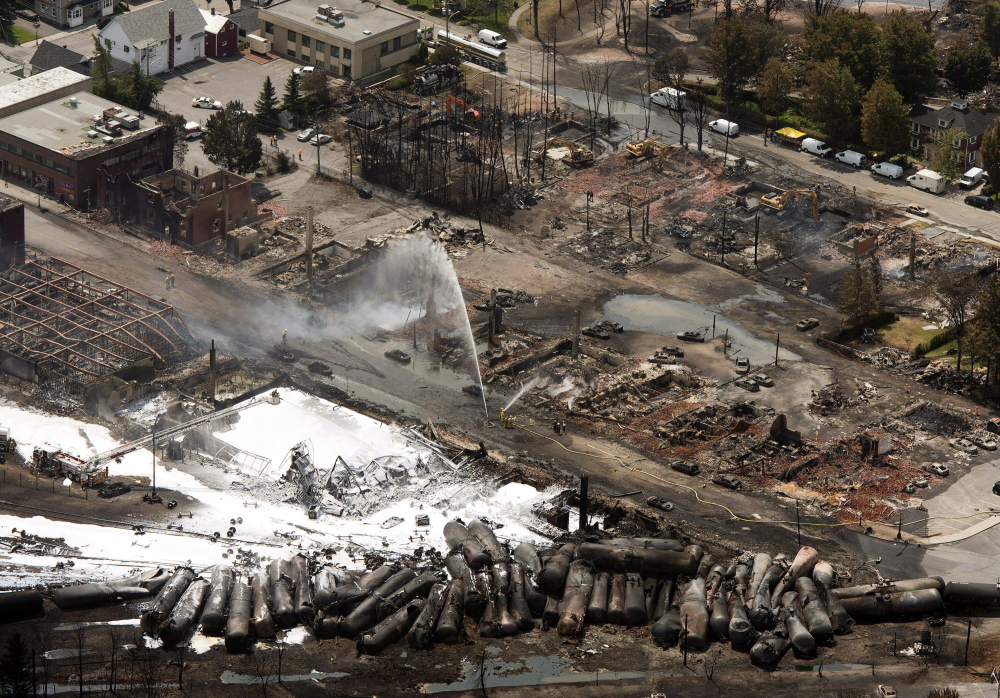MONTREAL – The deputy mayor of a Quebec town where a fiery oil train derailment killed 47 people said Monday a proposed settlement fund for victims represents just a fraction of what’s needed.
A $200 million settlement was announced last week, with more than one-half of the money going to various levels of government. About $50 million is destined for relatives of the 47 people who died in the July 2013 disaster, although the amount could rise. The settlement involves the Montreal Maine and Atlantic Canada Co., its insurance carrier, rail-car manufacturers and some oil producers. Three major companies have declined to participate – World Fuel Services, Canadian Pacific Railway and Irving Oil.
Lac Megantic Deputy Mayor Richard Michaud said the families of the victims will share in the settlement money, which is “very little considering there are more than 20 orphans who must rebuild their lives.”
“Two hundred million can seem like a lot of money but in my opinion, it’s very little,” Michaud said. “Much more than $200 million has been injected by the federal and provincial government to decontaminate the devastated territory alone, and we’re not even talking about reconstruction.”
Much of downtown Lac Megantic was destroyed on July 6, 2013, by a raging fire caused when an unattended train with 72 oil tankers carrying volatile crude derailed after it began rolling downhill toward the town of 10,000 people. More than 60 tankers derailed and several exploded. Forty-seven people died, and dozens of buildings were destroyed.
U.S. bankruptcy trustee Robert Keach is hoping the $200 million amount rises considerably before final approval of the plan in U.S. and Canadian courts.
Keach, a court-appointed trustee in the defunct railroad’s bankruptcy case in Maine, said the draft sets aside about $50 million of the $200 million pool for wrongful death claims, which could increase through a reallocation of the federal government’s share to as much as $57 million.
Up to $29 million could go to property damage, while another $19 million could go to bodily injury and moral damage claims, Keach said.
Those amounts reflect a possible reallocation of the federal government’s take. As it currently stands, more than 52 percent of the overall funds would go to provincial, federal and municipal governments. The formulas could change if the amount goes up.
“This is only a draft, so there are separate but parallel processes on both sides of the border,” Keach said. “The hope is we’ll have all the approval orders in place in early to mid-April so we could have a distribution in place by June or July.
“We are hoping (the final amount) grows between now and then, but the deadline for it growing is going to be those final hearings,” he added.
Yannick Gagne, owner of the Musi-Cafe, a business that was destroyed and where the majority of the victims died, said money won’t bring back the lives lost but could help with the relaunch of the downtown. Plenty more money will be required, however, to rebuild the town center essentially from scratch, he said.
Reconstruction costs are significant and Gagne himself has taken out loans, used insurance money and paid out of pocket. He also spent seven months out of work.
“For many people, it was a difficult time financially,” said Gagne, whose cafe quietly reopened on Dec. 15. “The mayor said it best –that $200 million is not sufficient.
“We are a long way from what we need. And it’s not up to the population to pay for this tragedy.”
Lac-Megantic Mayor Colette Roy Laroche said over the weekend the estimated cost of rebuilding the town is about $2 billion.
Send questions/comments to the editors.



Success. Please wait for the page to reload. If the page does not reload within 5 seconds, please refresh the page.
Enter your email and password to access comments.
Hi, to comment on stories you must . This profile is in addition to your subscription and website login.
Already have a commenting profile? .
Invalid username/password.
Please check your email to confirm and complete your registration.
Only subscribers are eligible to post comments. Please subscribe or login first for digital access. Here’s why.
Use the form below to reset your password. When you've submitted your account email, we will send an email with a reset code.